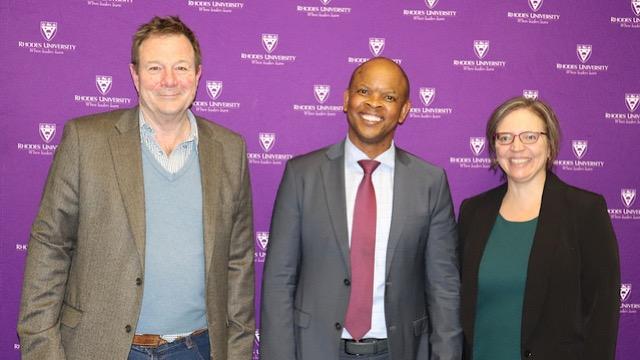
Max Boqwana is a Rhodes University alumni and an internationally-respected lawyer, having occupied leadership roles in the legal profession locally and abroad. He is the former Secretary-General and later President of the National Association of Democratic Lawyers (NADEL), a Co-Chairperson of the Law Society of South Africa for an unprecedented three-year term, previous Treasurer and current President of the regional body, SADC Lawyers Association and he has served as the Member of the Bureau of the International Association of Democratic Lawyers (IADL).
Before conducting the lecture, Boqwana reflected on the book The End of Lawyers? Rethinking the Nature of Legal Services by Professor Richard Susskind. He highlighted that his topic was an important one, especially in assessing how far the country has come with regards to the legal profession. “Is it still possible to regard the legal profession as an honourable one?” he asked those in attendance. He further pointed out that lawyers are called to perform their work with honour, diligence, fairness, and importantly, in pursuit of justice.
In his public lecture, Boqwana stated that many legal professionals are nowadays driven by the need to acquire lavish lifestyles at the expense of justice. He further noted that it takes an exceptional character not to be influenced and guided by this system. He went on to say that auditors and lawyers, due to their skills and knowledge, occupy a privileged position to act in the interests of another person, especially vulnerable and needy people. However, trust towards these two professions is deteriorating on a daily basis because they are occasionally substituting their client’s best interest with their own.
Lawyers’ work must be guided by truth, fairness, justice, and more importantly, it must not be inconsistent with the society’s public morality. They should do their work diligently and implement necessary skills towards the public interest. Because of the monopoly of legal services, the legal system is especially dependent on an ethical environment and it is, in turn, required to foster an ethical society.
However, many money laundering schemes are facilitated by lawyers and auditors and this does not only result in unethical conduct, but reflects a situation where clients, mainly poor and unsuspecting, have suffered losses as the result of their contact with lawyers. Boqwana pointed out that the amount of disciplinary matters currently before the Legal Practice Council (the regulatory body for legal practitioners) is astounding. This shows that lawyers are failing the country since they are actually mandated to protect the public interest.
“The sources and origin of these behaviours seem to be planted within a vicious cycle, and who is to blame for this?” he pondered. He suggested that many lawyers in South Africa subscribe to the ‘greed and self-interest gospel’ identified by Marc Lewis in his book Sin to Win: Seven Deadly Steps to Success.
He pleaded with those in attendance that a new generation of lawyers should arise who incarnate a rediscovery of the humanising vocation of the legal profession. This new generation could further demonstrate the power of thought to negate accepted limits and open the way to a new future. He challenged tertiary institutions to look at the educational paradigm which underpins the trainings of lawyers by asking:
- Is what we are teaching relevant to our society?
- Should we not design an education system that is based on a detailed understanding of our contemporary problems and that seeks to develop change agents that will solve these problems?
- How do we produce lawyers whose vision is to end poverty, foster equality and independence of thought and vocation?
- How do we create a lawyer who is committed to the services of humanity?
He concluded his lecture by saying that unethical conduct by lawyers signals the end of the profession and, as such, those prominent lawyers in South Africa who are guilty of misconduct need wholesale condemnation.
